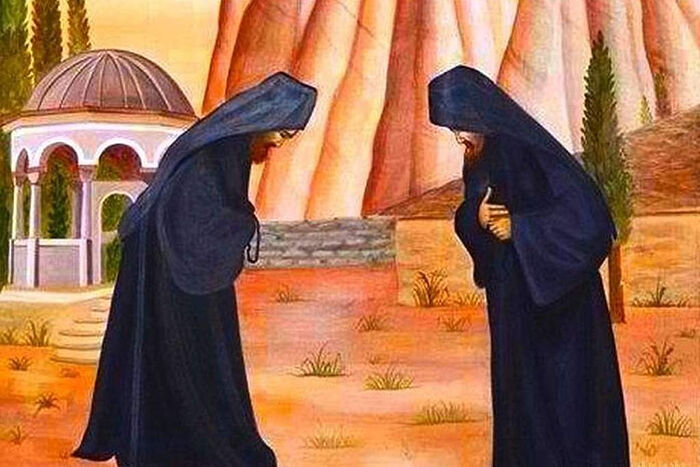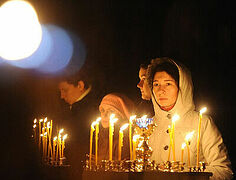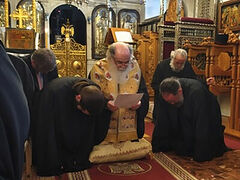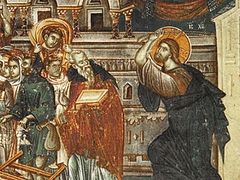The following homily was delivered by Bishop Irenei of London and Western Europe on the Sunday of the Expulsion of Adam and Eve from Paradise, being the Sunday of Forgiveness, 4 / 17 March 2024, in the Cathedral of the Nativity of the Mother of God and the Holy Royal Martyrs in London, England.
In the Name of the Father, and of the Son, and of the Holy Spirit:
What does it mean to forgive? Is it an exoneration? Is it acceptance of a wrong? Is it dismissal of the pain or hurt caused by a wrong that has been done?
These are common understandings, but they are misconceptions. They are ideas that often prevent people from being willing to forgive, since they seem either impossible, or even undesirable when we witness the true extent of evil sometimes done in this world, and sometimes to us. Yet these are things that true forgiveness should not, and cannot, be.
To forgive is not to exonerate one who has committed wrong: to say he bears no responsibility, or that he is exempted from the reality his wrong has created. This legalistic reading might be how the term is used in society, but it is not so in the spiritual life. When the Saviour forgave His executors from the wood of the precious Cross, it was not an exoneration of their act. It was not a statement that somehow the wrong they were doing was not real, or was not truly wrong.
To forgive is, likewise, not to embrace a wrong, as if to state that it is thereafter deemed ‘acceptable’ that a wrong was committed. When the Saviour forgave Judas the betrayer, which surely He freely and wholly did, this was not to accept as right the betrayal. Judas should not have betrayed his Lord; man should not have betrayed his God — and the forgiveness he meets in Christ does not change this. The wrong is still a wrong, and it being forgiven does not mean it is accepted or acceptable, and more than it means it is dismissed as exonerated.
Nor is forgiveness to dismiss the pain that comes from wrongdoing. When the Mother of God forgave those who had killed her Son, the Creator of the universe, which she surely and wholly did, she did not, in this act, pretend that she no longer felt the grief occasioned by their act. Her forgiveness did not eradicate her tears.
Forgiveness, real forgiveness, is the liberation of the human heart. It is an act that we undertake in the face of wrong, but it is not chiefly an act for the wrongdoer, but for the one who has been wronged. When we forgive, something happens within us; and if we can find the strength to step away from worldly understandings, then we will see it as a necessary step in attaining the freedom to grow in Christ and in His holiness.
To forgive is to cast away the chains that another’s words or actions have fastened around our heart. It is to recognise that to continue to live in a manner defined by their actions, and our responses to them, is to be enslaved. And we seek not to be enslaved, but to be set free.
To forgive is to seek what is good, above what is evil. It is to see in the other — even the one who wrongs us, or goes so far as genuinely to hate us — that which his wrongdoing seeks to hide from us: the beauty of a creature struggling to be free from sin, so often failing in this task, yet worth more than simply being considered the sum of his faults and transgressions. For we seek not to destroy our brother, but to save him.
To forgive is not to dismiss the flaws we behold in another; but it is to begin to see them in light of the flaws and sin we see also in ourselves. Hatred of another’s wrongs is harder to maintain when we are honest about our own; and condemnation is harder to justify, when we realise that we are ourselves in need of mercy. Can we withhold mercy to another, whose acts clearly demonstrates that he needs it, and then expect to receive it ourselves?
To forgive, my brothers and sisters, is to be honest: about ourselves, about each other, and above all about God and how He sees each one of us. It is therefore a commandment, not a suggestion: one cannot live in Truth without being truthful, and one cannot be honest and truthful before God without forgiving our neighbour — the neighbour who seeks our forgiveness, as well as the one who does not. The one who loves us in return, but also the one who hates us. We can do as Christ does, and as He commands; or we can walk away from Him altogether. There is no other path.
Today, therefore, let us each be honest Christians, and so start anew to taste the presence of real love by seeking each other’s forgiveness, and granting it as our Lord commands. Amen!




